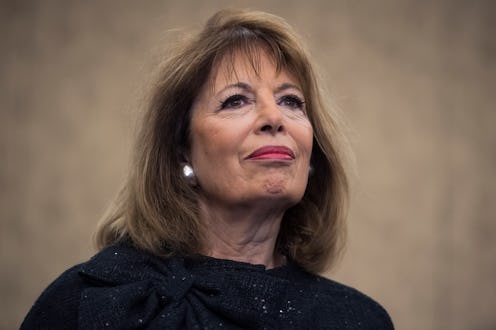News
This Is Why Women Democrats Will Wear All-Black To Trump’s First Major Speech Of 2018

America's desperately-needed confrontation of sexual abuse in various industries has also reached Capitol Hill. In an interview with NBC News on Tuesday, California Democrat Rep. Jackie Speier invited other lawmakers to wear black to President Trump's State of the Union address, which will take place later in January.
"This is a culture change that is sweeping the country, and Congress is embracing it," Speier said, referring to the ongoing national reckoning with sexual harassment and abuse that has taken down powerful men in tech, media, entertainment — and politics. The California representative said that the plan to wear black to Trump's State of the Union was highly supported by the women of Democratic Women's Working Group.
Speier's announcement comes days after actors and actresses wore all-black to the Golden Globes ceremony on Sunday. Hollywood celebrities said that their move to wear black was to show support for victims of sexual assault and harassment. The gesture elicited a lot of praise — and some criticism — from observers about its efficacy and meaning.
Speier's call for wearing black to Trump's address later in January could receive a lot of support from women Democratic lawmakers. In December, almost 60 Democratic women lawmakers called on the Congress to investigate accusations of sexual misconduct against the president. Trump has broadly denied all allegations of sexual wrongdoing but the discussion on the president's alleged sexual misconduct remains high as ever.
In the open call for Congress to launch an inquiry into accusations against Trump, the signatories referred to the #MeToo movement. The movement gained momentum in 2017 after actress Alyssa Milano tweeted about it, calling for survivors of sexual abuse to share their stories. The declaration of "Me Too" was originally conceived by activist Tarana Burke.
In the time of "Me Too," women across the country are coming forward with their own harrowing stories of sexual harassment and assault. Members of Congress have also come under scrutiny and investigation, with some resigning, for improper sexual conduct. We cannot ignore the multitude of women who have come forward with accusations against [Donald Trump].
In addition to Speier's call for wearing black, other efforts at combating sexual misconduct have also took place on Capitol Hill. In November, House Speaker Paul Ryan declared that there would be mandatory sexual harassment training for members of the House of Representatives. Ryan said that the goal of such training was to "not only to raise awareness, but also make abundantly clear that harassment in any form has no place in this institution."
With legislation in the works, Minnesota Sen. Amy Klobuchar said in November that the training would help make staffers and members of the House feel safe.
Sexual and workplace harassment is a widespread problem that affects too many women and men in too many places, professions, and industries. Everyone deserves to feel safe and comfortable at work, and the passage of this official Senate policy is an important measure to ensure that's the case in these halls.
In other words, the momentum on Capitol Hill to address sexual violence in the workplace seems to be high. From mandatory sexual harassment training, public support for safer environments from lawmakers to Chief Justice John Roberts announcing a careful review of the judiciary's sexual misconduct policies, the #MeToo movement is taking the issue of sexual misconduct in politics by the horns.
That said, for the #MeToo movement to have any actual and positive results, it needs solidarity from allies. Perhaps this is why Speier did not limit her invitation to women only. While calling on other lawmakers to wear black on Tuesday, she said both women and men should participate in the protest against sexual misconduct.